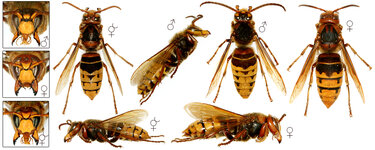Hello everyone,
I have joined this forum with a cause in mind. I keep bees and live in Torbay where I am on the committee of Torbay Bee keepers Association. I am also working with a Devon group of bee keepers who are forming teams of like minded apiarists who are going to be the first line of defense in Devon against the invasion of Asian Hornet that could come to the UK any time next year
Are there any beekeepers on this site and has the topic of Asian Hornet been raised? I ask because although bee keepers will know of the danger we face a real threat to our honey bees and other pollinators if the Asian Hornet (AH) gets established in the UK. It could wipe out honey bees and then you would get no more of that lovely sticky sweet stuff to have on your cakes and breakfast. crops could fail because of lack of pollination and its not a nice beast to be stung by. When I searched other camping websites it seemed campers in general were not aware of a problem!
It is thought that the last outbreak in the summer of 2017 in Woolacombe, Devon could have been from a queen hornet brought into the UK from France or Spain in a camping unit Like a Caravan, motorhome or trailer tent.
I am a motorhome owner and last January we went for a two month trip to the Algarve. On our journey down through Franch we saw two or three Asian Hornet (Vespa velutina V.v) nests high in trees. We knew what they were but since it was winter we knew they were effectively dead because the colony dies out when the new queens fly off to find hibernation quarters. But we never dreamed that we could provide a lift to such an unwanted and devastating pest.
It turns out that caravans, motorhomes and trailer tents have nice cosy spaces where insects can hibernate and the of course owners drive home to th UK for the start of spring and the insects find themselves in a new country and in the case of Vespa velutina lots of honey bee hives to provide their food because The UK has lots of bee keepers to provide the honey that we all like.
It is thought that the outbreak in Woolacombe, Devon was just such an instance of a V.v queen coming in a caravan. The owners of the property where the nest was found owned a caravan and had come back fron southern France where the hornet is endemic. They apologised to the bee keeper whose hives were being raided for having the nest in their hedge.
Asian Hornets devastate honey bee colonies by hawking round the entrance of the hive and taking bees on the wing. They bit the head and abdomen off and fly away to their nest with the thorax where they feed the larvae with the protein from the muscles that control the bee's wings and legs
We want to raise awareness of the problem through the camping and caravaning websites. We want owners of rigs to look out for the insect and kill any that get inside units or are found in units. And if you see a bid brownish wasp like insect fly out of your unit when you get bak to UK please get in touch with your local bee keeping association (GOOGLE BBKA) for advice.
There is an app for mobiles which shows what you are looking for and enables you to report an occurrence to the appropriate authorities like the National Bee Unit and the Non Native Species Secretariat. You can find the App (called Asian Hornet App) on Google Play and on the Android app site or if you google 'Asian Hornet Watch'.
In the mean time you can go on Youtube to find lots of video clips to see what the hornet looks like.
Thanks and keep a look out!
I have joined this forum with a cause in mind. I keep bees and live in Torbay where I am on the committee of Torbay Bee keepers Association. I am also working with a Devon group of bee keepers who are forming teams of like minded apiarists who are going to be the first line of defense in Devon against the invasion of Asian Hornet that could come to the UK any time next year
Are there any beekeepers on this site and has the topic of Asian Hornet been raised? I ask because although bee keepers will know of the danger we face a real threat to our honey bees and other pollinators if the Asian Hornet (AH) gets established in the UK. It could wipe out honey bees and then you would get no more of that lovely sticky sweet stuff to have on your cakes and breakfast. crops could fail because of lack of pollination and its not a nice beast to be stung by. When I searched other camping websites it seemed campers in general were not aware of a problem!
It is thought that the last outbreak in the summer of 2017 in Woolacombe, Devon could have been from a queen hornet brought into the UK from France or Spain in a camping unit Like a Caravan, motorhome or trailer tent.
I am a motorhome owner and last January we went for a two month trip to the Algarve. On our journey down through Franch we saw two or three Asian Hornet (Vespa velutina V.v) nests high in trees. We knew what they were but since it was winter we knew they were effectively dead because the colony dies out when the new queens fly off to find hibernation quarters. But we never dreamed that we could provide a lift to such an unwanted and devastating pest.
It turns out that caravans, motorhomes and trailer tents have nice cosy spaces where insects can hibernate and the of course owners drive home to th UK for the start of spring and the insects find themselves in a new country and in the case of Vespa velutina lots of honey bee hives to provide their food because The UK has lots of bee keepers to provide the honey that we all like.
It is thought that the outbreak in Woolacombe, Devon was just such an instance of a V.v queen coming in a caravan. The owners of the property where the nest was found owned a caravan and had come back fron southern France where the hornet is endemic. They apologised to the bee keeper whose hives were being raided for having the nest in their hedge.
Asian Hornets devastate honey bee colonies by hawking round the entrance of the hive and taking bees on the wing. They bit the head and abdomen off and fly away to their nest with the thorax where they feed the larvae with the protein from the muscles that control the bee's wings and legs
We want to raise awareness of the problem through the camping and caravaning websites. We want owners of rigs to look out for the insect and kill any that get inside units or are found in units. And if you see a bid brownish wasp like insect fly out of your unit when you get bak to UK please get in touch with your local bee keeping association (GOOGLE BBKA) for advice.
There is an app for mobiles which shows what you are looking for and enables you to report an occurrence to the appropriate authorities like the National Bee Unit and the Non Native Species Secretariat. You can find the App (called Asian Hornet App) on Google Play and on the Android app site or if you google 'Asian Hornet Watch'.
In the mean time you can go on Youtube to find lots of video clips to see what the hornet looks like.
Thanks and keep a look out!






